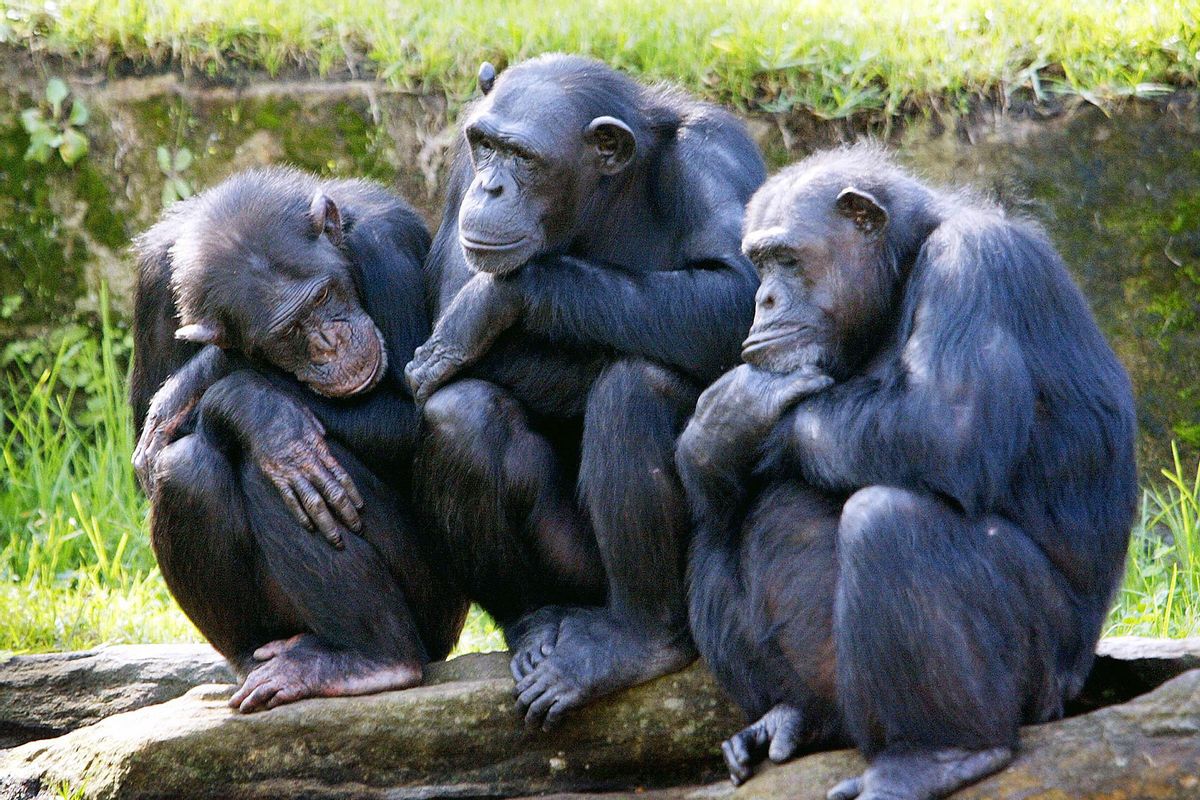Humans are not merely adept at communicating danger — it is seemingly built into our brains. That may be true for most social animals, but not all animals can communicate using specific nouns or verbs to refer to present dangers. That, it seems, is the unique power of human language, an ability that provides a strong evolutionary advantage. If you're chatting idly with your neighbors and suddenly see something dangerous — say, a rattlesnake — mutual yells and shouts abound; and, after the surprise of the snake abates, humans move to recruit others to deal with the problem.
But whether all animals work and communicate this way, or just humans (or our ape relatives), is an open question. Hence, in a recent study published by the journal Nature Communications, researchers placed fake snakes among wild chimpanzees in Uganda to see if they would respond in the same way as humans — communicating the specific danger, then working together to manage it.
What happened next changed the way we understand the evolution of human language.
Just as humans might react urgently if they heard a person shout "Oh my gosh! Help!", the chimpanzees were alarmed when scientists pranked them with the chimp version of that phrase.
The researchers from the University of Zurich observed that chimpanzees in Uganda produced a sound they call "waa-barks" in order to recruit other chimpanzees. If a chimpanzee was surprised, they'd produce sounds called "alarm-huus."
Knowing this, the researchers placed model snakes near chimpanzees, and then played recordings of either one of those sounds, or both together. Consistently, the researchers saw the same results: The spooked chimpanzees reacted "most strongly" and by "showing longer looking responses" when the "waa-barks" and "alarm-huus" were used in the correct combination. That very much implies the existence of a chimpanzee "language," or at least something akin.
Just as humans might react urgently if they heard a person shout "Oh my gosh! Help!", the chimpanzees were alarmed when scientists pranked them with the chimp version of that phrase. As the authors explained, they had predicted that other chimpanzees in the group would join the call expressing alarm and seeking help once it was heard. Importantly, they found that the chimpanzees only reacted in this way when they heard that specific combination of calls; merely giving one of the "waa-barks" in isolation, or one of the "alarm-huus" in isolation, was simply not as effective.
These two phrases might form the basis of a proto-sentence in their language, researchers think.
"We propose the 'alarm-huu + waa-bark' represents a compositional syntactic-like structure, where the meaning of the call combination is derived from the meaning of its parts," the authors explain in their study. They speculate that this has implications far beyond simply understanding chimpanzee language; it suggests that the complex compositional structures that define human language did not originate with our species, "but that the cognitive building-blocks facilitating syntax may have been present in our last common ancestor with chimpanzees."
"Humans and chimpanzees last shared a common ancestor approximately 6 million years ago," study last author, University of Zurich professor Simon Townsend, explained in a statement. "Our data therefore indicate that the capacity to combine meaningful vocalizations is potentially at least 6 million years old, if not older."
Want more health and science stories in your inbox? Subscribe to Salon's weekly newsletter The Vulgar Scientist.
In 2022 a study published by the journal Communications Biology demonstrated that chimpanzees can produce as many as 390 unique vocal sequences.
The study is remarkable for what it says about the evolution of language and of the intelligence of the great apes. It follows a flurry of recent interest in the complexities of primate language. In 2022 a study published by the journal Communications Biology demonstrated that chimpanzees can produce as many as 390 unique vocal sequences. While the scientists were only able to connect those vocal sequences to specific objects and actions, that does not mean chimpanzees only have 390 words. Indeed, the way that the chimpanzees combined those vocal sequences suggests they can create new words from them.
"From a purely structural perspective, the capacity to organize single units into structured sequences offers a versatile system potentially suitable for expansive meaning generation," explained the authors of the study, which analyzed chimpanzees in Côte d'Ivoire. "Further research must show to what extent these structural sequences signal predictable meanings."
Since the average human 20-year-old English speaker knows an estimated 42,000 words, according to Science magazine, both that study and the new one raise the provocative possibility that chimpanzees can communicate on a level comparable with human beings. Since neither study comes anywhere close to proving that, however, further research will be needed. As the authors of the 2022 study put it, "From a purely structural perspective, the capacity to organize single units into structured sequences offers a versatile system potentially suitable for expansive meaning generation. Further research must show to what extent these structural sequences signal predictable meanings."
Similarly, primatologist Adriano Lameira has demonstrated through his research that orangutans — which share 96.4% of their genes with humans — have distinct dialects based on their regional cultures, much as human beings do. Lameira argues that orangutans are so intelligent that they deserve legal rights within human judicial systems, both because their lives have intrinsic value and because studying them can help people learn a lot about their own use of language.
"They're extremely intelligent, they're very similar to us, they have cultures, they have prototypical behaviors that are assumed to be precursive of language," Dr. Adriano Lameira told Salon last year.

Shares